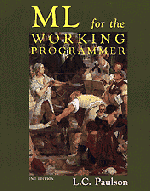Book contents
- Frontmatter
- Contents
- Preface to the Second Edition
- Preface
- 1 Standard ML
- 2 Names, Functions and Types
- 3 Lists
- 4 Trees and Concrete Data
- 5 Functions and Infinite Data
- 6 Reasoning About Functional Programs
- 7 Abstract Types and Functors
- 8 Imperative Programming in ML
- 9 Writing Interpreters for the λ-Calculus
- 10 A Tactical Theorem Prover
- Project Suggestions
- Bibliography
- Syntax Charts
- Index
- PREDECLARED IDENTIFIERS
1 - Standard ML
Published online by Cambridge University Press: 05 June 2012
- Frontmatter
- Contents
- Preface to the Second Edition
- Preface
- 1 Standard ML
- 2 Names, Functions and Types
- 3 Lists
- 4 Trees and Concrete Data
- 5 Functions and Infinite Data
- 6 Reasoning About Functional Programs
- 7 Abstract Types and Functors
- 8 Imperative Programming in ML
- 9 Writing Interpreters for the λ-Calculus
- 10 A Tactical Theorem Prover
- Project Suggestions
- Bibliography
- Syntax Charts
- Index
- PREDECLARED IDENTIFIERS
Summary
The first ml compiler was built in 1974. As the user community grew, various dialects began to appear. The ml community then got together to develop and promote a common language, Standard ml — sometimes called sml, or just ml. Good Standard ml compilers are available.
Standard ml has become remarkably popular in a short time. Universities around the world have adopted it as the first programming language to teach to students. Developers of substantial applications have chosen it as their implementation language. One could explain this popularity by saying that ml makes it easy to write clear, reliable programs. For a more satisfying explanation, let us examine how we look at computer systems.
Computers are enormously complex. The hardware and software found in a typical workstation are more than one mind can fully comprehend. Different people understand the workstation on different levels. To the user, the workstation is a word processor or spreadsheet. To the repair crew, it is a box containing a power supply, circuit boards, etc. To the machine language programmer, the workstation provides a large store of bytes, connected to a processor that can perform arithmetic and logical operations. The applications programmer understands the workstation through the medium of the chosen programming language.
Here we take ‘spreadsheet’, ‘power supply’ and ‘processor’ as ideal, abstract concepts. We think of them in terms of their functions and limitations, but not in terms of how they are built.
Information
- Type
- Chapter
- Information
- ML for the Working Programmer , pp. 1 - 16Publisher: Cambridge University PressPrint publication year: 1996
